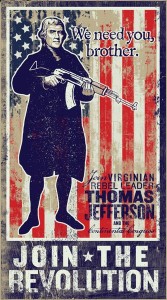 Recently, several casual conversations with some of my history majors have veered toward historical counterfactuals. Counterfactuals, or the fictional incarnation of the historical counterfactual, “alternate history,” posits a world in which one or more historical variables is different than the actual past. We’ve all played this game at some point, and undergraduates seem to love this exercise. What if Washington had failed to cross the Delaware River in 1776? What if Lee had won at Gettysburg? What if Teddy Roosevelt had not declared he wouldn’t seek another presidential term in the 1908 election?
Recently, several casual conversations with some of my history majors have veered toward historical counterfactuals. Counterfactuals, or the fictional incarnation of the historical counterfactual, “alternate history,” posits a world in which one or more historical variables is different than the actual past. We’ve all played this game at some point, and undergraduates seem to love this exercise. What if Washington had failed to cross the Delaware River in 1776? What if Lee had won at Gettysburg? What if Teddy Roosevelt had not declared he wouldn’t seek another presidential term in the 1908 election?
As you can tell, counterfactuals tend to focus on battles, generals, and elections; the kinds of decisive turning points in history that we can isolate as variables and shoehorn into a formula. We know history doesn’t always (or even often) actually work that way, and that the past is complex, malleable, and often far from precise. That doesn’t stop students from trying it. So, the question that arises from this is: are counterfactuals of any use in a teaching environment? If counterfactuals excite and engage a segment of our students, shouldn’t we then at least consider whether and how to incorporate them into our teaching?
Political scientists, sociologists, and philosophers sometimes engage in a dense form of counterfactual theory that would likely send one of my average undergrads into a stupor (“The transitivity of causation fits with some of our explanatory practices. For example, historians wishing to explain some significant historical event will trace the explanation back through a number of causal links, concluding that the event at the beginning of the causal chain is responsible for the event being explained. On the other hand, a number of counter-examples have been presented which cast doubt on transitivity.”) Counterfactuals are also the territory of fantasy and science fiction authors, Hollywood screenwriters, and the feverish musings of entire online communities.
A potentially crippling problem with using counterfactuals as a pedagogical tool is that we may privilege “great men/women” history by placing inordinate importance on individuals, or that we emphasize events like wars and elections to the exclusion of more important, more subtle, or less comprehensible historical processes in play. Another problem is obvious; piling up inferences and tinkering with the past risks confusing students who are often still acquiring a basic understanding of what actually happened. Why confuse them by asking them to rethink history to favor a fictional account of the past?
There is potential for reward in counterfactuals, as well. These kinds of exercises seem like an easy and natural way to introduce history students to ideas like causation and contingency; concepts that are particularly valuable in demonstrating that the course of American history is anything but inevitable. Plus, students seem to think they’re fun.
With all that said, what do you think? Can we use counterfactuals in a useful way? If so, how might we go about it?


I often push students to think about whether the Civil War was unavoidable. This discussion can (and often does) turn into a counterfactual debate that I think is very productive as we discuss what particular events pushed America towards war.
I discuss with my students why arguments about historical causation are implicitly counterfactual (no cause/no result). I’ve used John Murrin’s essay on the connections between the French & Indian War and the American Revolution as a great example of counterfactual writing.
Rachel, thanks for the essay suggestion. Another piece that might be useful is Gary J. Kornblith, “Rethinking the Coming of the Civil War: A Counterfactual Exercise” in the Journal of American History.
My first real exposure to using counterfactuals in an academic setting stems from a talk that Mark Grimsley delivered at Rice University while I was a graduate student. While Mark’s presentation was excellent, I recall that some of the academics in the room seemed rather skeptical about the utility of counterfactuals. The students there, on the other hand, seemed fairly enthusiastic.
I’m still not totally sold on their utility, but from what I’ve seen from students, they enjoy playing the game. And more advanced undergrads also seem to like picking apart the flaws inherent in the exercise, as well.
I do not teach counterfactuals, but rather contingency. Ed Ayers and James McPherson both have spent time talking about the contingency of the Civil War, arguing that none of the outcomes were inevitable. That is obvious to us as professional historians, but it is not necessarily so for our students. We have to talk about the unforeseen, unplanned, and unconscious events that determine an outcome. For example, the Civil War did not have to end with emancipation and United States victory. As Gary Gallagher argues, Lee was not even foreordained to take command of the Confederate army in the early summer of 1862. Had he not, and George B. McClellan won on the Peninsula instead, the war would not have been prolonged by Lee, which ultimately helped push the Lincoln administration toward adopting emancipation as a formal policy. I spent time in class last week talking about inevitability vs. contingency, and the students seemed to follow what I was offering.